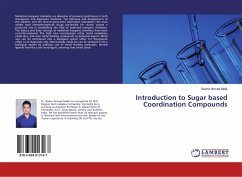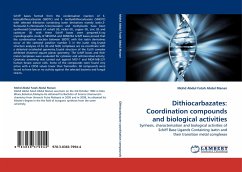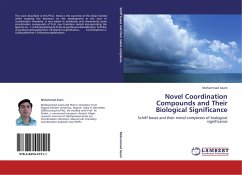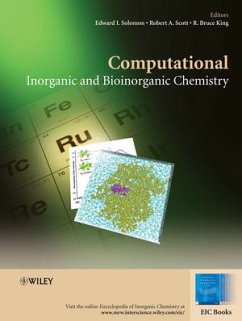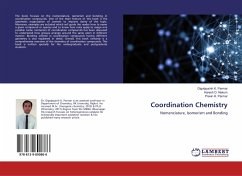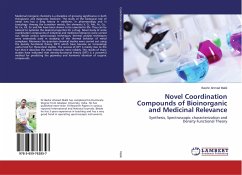
Novel Coordination Compounds of Bioinorganic and Medicinal Relevance
Synthesis, Spectroscopic characterization and Density Functional Theory
Versandkostenfrei!
Versandfertig in 6-10 Tagen
36,99 €
inkl. MwSt.

PAYBACK Punkte
18 °P sammeln!
Medicinal inorganic chemistry is a discipline of growing significance in both therapeutic and diagnostic medicine. The study of the biological role of metal ions has a long history in medicine, in pharmacology and in toxicology. Among the transition metals, the elements V, Cr, Mn, Fe, Co, Ni, Cu, Cd, Zn and Mo have been shown to be essential to life. They can be tailored to optimize the desired properties for a drug. Novel study of some coordination compounds of industrial and medicinal relevance were carried out. Beside various spectroscopic techniques, thermal analysis techniques were extens...
Medicinal inorganic chemistry is a discipline of growing significance in both therapeutic and diagnostic medicine. The study of the biological role of metal ions has a long history in medicine, in pharmacology and in toxicology. Among the transition metals, the elements V, Cr, Mn, Fe, Co, Ni, Cu, Cd, Zn and Mo have been shown to be essential to life. They can be tailored to optimize the desired properties for a drug. Novel study of some coordination compounds of industrial and medicinal relevance were carried out. Beside various spectroscopic techniques, thermal analysis techniques were extensively used in studying of the thermal behavior of metal complexes. Moreover the quantum chemical studies were carried out using the density functional theory (DFT) which have became an increasingly useful tool for theoretical studies. The success of DFT is mainly due to the fact that it describes the small molecules more reliably. The results of many studies have indicated that density-functional theory (DFT) is a powerful method for predicting the geometry and harmonic vibration of organic compounds.




